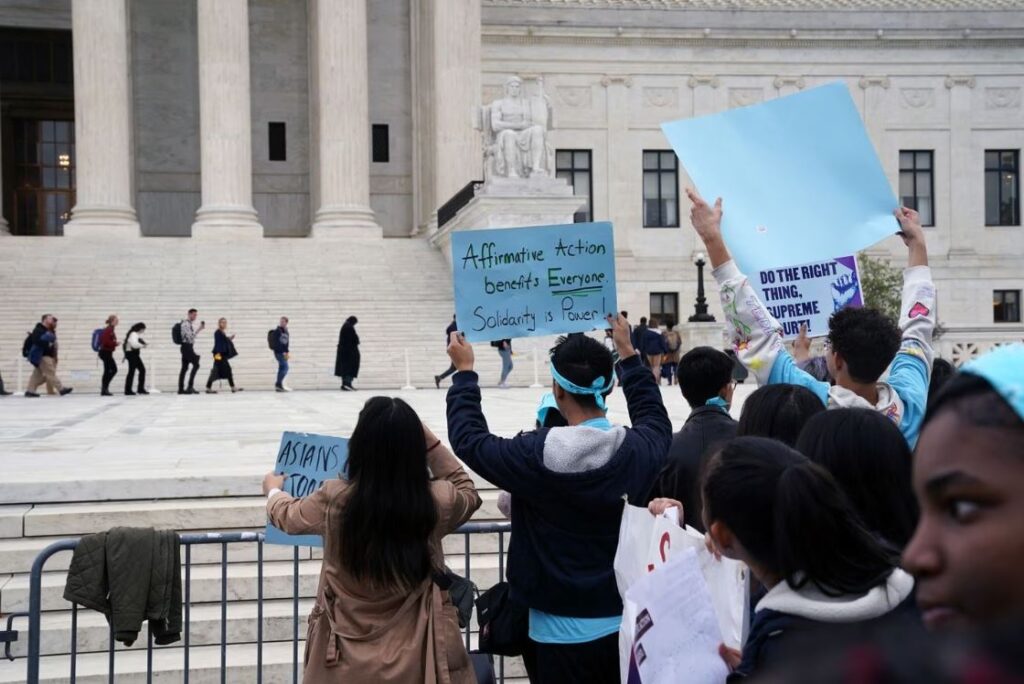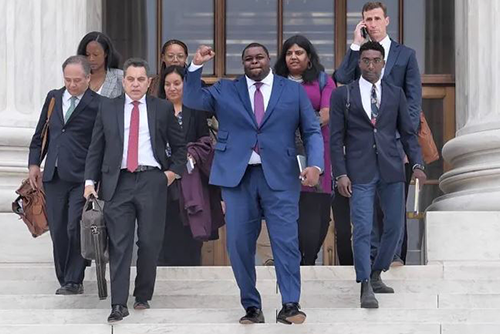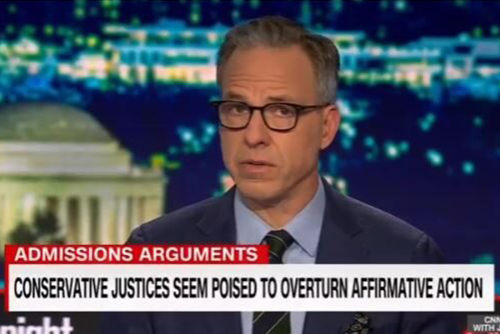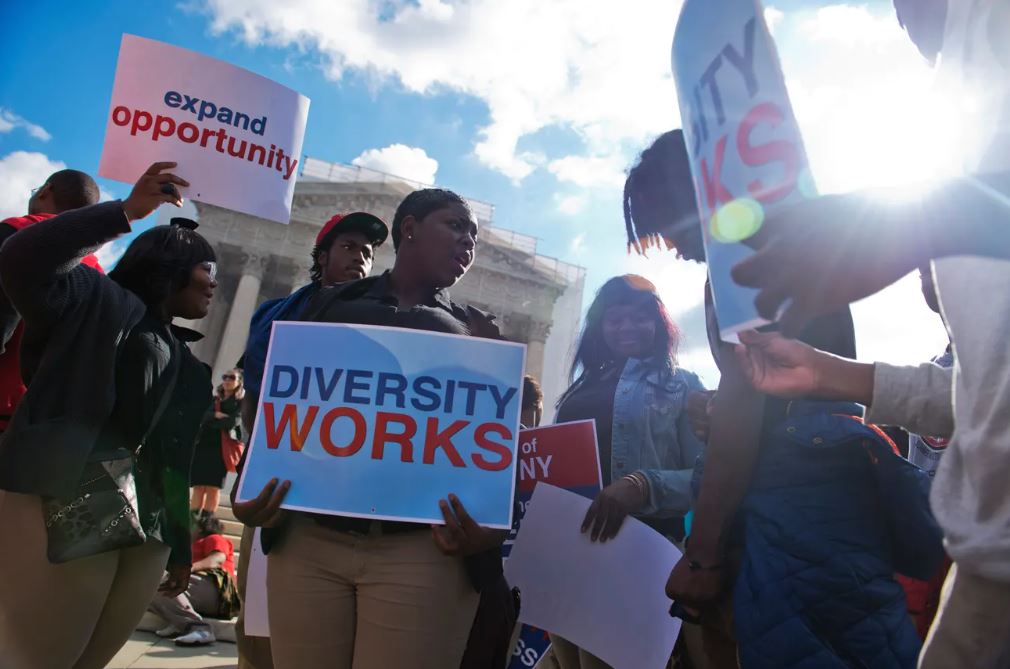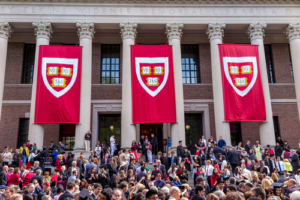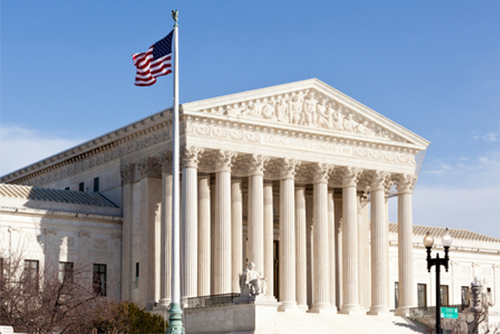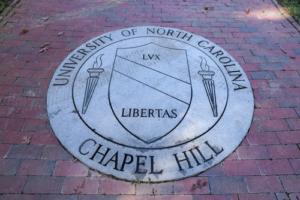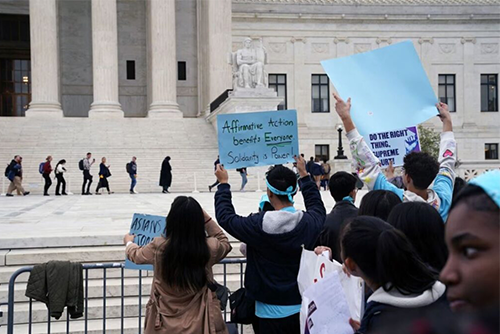The Supreme Court Undermines Affirmative Action.
THE SUPREME COURT decision threatens to make higher education less accessible, less equitable, and less attainable for students of color.
Now it’s up to us.
Read Our Statement
Press Conference
Make no mistake – while today’s decision undermines affirmative action as we know it, the fight for opportunity for all in higher education does not stop. We all have a role to play in improving access to higher education moving forward, from elected officials and corporate leaders to academic institutions and government institutions. The Court has changed the law. Now, we must change the system. Join us as we fight harder than ever so that every student who wants to go to college has a fair shot to do so.
Affirmative Action Q&A – Expert answers to the most pressing questions on Supreme Court decisions in SFFA v Harvard/UNC
Navigating the Affirmative Action Rulings
An In-Depth Analysis
Five Things You Can Do to Advance and Protect Diversity and Racial Equality
Defending Diversity. Affirming Opportunity.
The Lawyers’ Committee for Civil Rights Under Law represents a diverse group from University of North Carolina at Chapel Hill, as well as Harvard University students and alumni, in the fight to defend the universities’ right to consider race as one of many factors in the admissions process. SFFA v. UNC Chapel-Hill and SFFA v. Harvard challenge the race-conscious admissions policies of these universities. David Hinojosa (Director of the Educational Opportunities Project for Lawyers’ Committee for Civil Rights Under Law) argued before the Court on October 31, 2022, to ensure that the lived experiences of students of color are heard loud and clear. As the fate of affirmative action hangs in the balance, stay updated on the fight for education equity.
The Fight Continues: We sent a letter to 150+ colleges, universities and higher education institutions guiding how they can ensure equal opportunity and access for all.
Case Background
UNC and Harvard both use holistic admissions processes that review letters of recommendation, guidance counselor reviews, alumni interviewer impressions, essays, and experiences, alongside academic performance. Every federal court to hear these challenges thus far has rejected the claims, consistent with longstanding legal precedent. But both cases are now being considered by the U.S. Supreme Court.
The Lawyers’ Committee is the only civil rights organization that has been litigating both cases since their inception, dating back nearly a decade. Our attorneys have worked closely with a diverse coalition of students of color, lifting up their voices and experiences in the courts of law and public opinion. A number of Lawyers’ Committee student clients were able to testify in the trial court in both cases. In the UNC Chapel Hill case, we secured a special status for our student clients as “intervenors,” meaning they had the opportunity to fully develop the facts and arguments at trial. In both cases, the trial judges credited our clients’ testimony as compelling and persuasive in ruling in favor of upholding the race-conscious admissions policies.
Click below to find a timeline of each case:
What’s at Stake

Student activists outside of the Supreme Court advocating for Affirmative Action

Student activists listening to Affirmative Action Rally
Race-conscious policies have opened up many doors for highly talented students of color who may otherwise be overlooked for admission due to structural and economic barriers.
- Colleges and universities that eliminated the lawful consideration of race as one of many factors in admissions, such as University of California system schools, saw immediate, sharp declines in racial diversity.
- Eliminating the consideration of race in Harvard’s process would cause the number of Black, Latinx, Native American, Hawaiian and Pacific Islander students to plummet by 50% – or by nearly 1,000 students over 4 years.
- Evidence from the SFFA v. UNC trial showed that without race-conscious admissions, the presence of underrepresented students on campus would substantially decline.
Even though affirmative action is important for higher education institutions, the impact reaches far beyond the classrooms. Diverse learning environments lead to more diverse workforces, and better prepare all students for success in the multiracial society we live in.
Student Voices

Affirmative Action activists holding signs at Supreme Court

Sign in support of Affirmative Action
In cases regarding race-conscious admissions, context is key, and no one is better equipped to tell this story than students and alumni. The history and legacy of the university and the ongoing dynamics on campus all play a role in carefully crafting an admissions policy that advances the institutional mission.
At the heart of the cases pending in the Supreme Court are testimonies uplifting the voices and experiences of our student clients. In SFFA v. UNC, the federal district court upheld UNC’s race-conscious admissions policy and affirmed the necessity of policies that promote diversity and recognize the tremendous talents of students of all backgrounds. The decision grounded its findings in the student experience—including testimony by Lawyers’ Committee clients—and carefully considered the distinct context of UNC and North Carolina, including UNC’s history of discrimination and current racial dynamics across the state and campus. Similarly, in SFFA v. Harvard, the district court and the U.S. Court of Appeals for the First Circuit relied heavily on student testimony and cites them extensively in their opinions.
Resources
Affirmative Action
Affirmative Action Q&A – Expert answers to the most pressing questions on Supreme Court decisions in SFFA v Harvard/UNC
Navigating the Affirmative Action Rulings – An In-Depth Analysis
Four Key Points Stakeholders Must Consider to Ensure Educational Opportunity for All
Five Things You Can Do to Advance and Protect Diversity and Racial Equality
Advancing Equal Employment Opportunity
Putting the Affirmative Action College Admissions Cases in Context
Webinar: Affirmative Action Decisions and the Workplace
In the News
US students on why affirmative action is crucial: ‘They need...
Harvard and UNC attendees address how applicants’ backgrounds shape their lives as supreme court hears case.
Veterans, First Time Advocate Arguing Fate of Affirmative Action
The six advocates arguing at the Supreme Court over the future of affirmative action in college admissions include high court…
Washington Post: As Supreme Court test looms, UNC defends...
Founded to educate the enslaving elite of this Southern state, allied for generations with the cause of white supremacy, roiled by racial…
With the fate of affirmative action in the hands of the Supreme...
For nearly 60 years, institutions of higher education have been able to give limited preference to people of color and women with admissions.
Conservative Supreme Court justices skeptical of continuing affirmative action, while liberal...
On Monday, the Supreme Court heard arguments in two cases challenging affirmative action. The likely outcome, experts said, is a nationwide ban on the consideration of race or ethnicity in…
Affirmative action is not and has never been a zero-sum game in college admissions
I watched from the gallery as the Supreme Court debated the future of race-conscious admissions. Problematic and largely negative framing in the debate obscures what is truly at stake.
Jake Tapper on Instagram- "Conservative Justices Seem Poised to Overturn Affirmative Action"
“We feel really confident after today,” attorney David Hinojosa tells @jaketapper after arguing the case to uphold affirmative action for the Univ. of North Carolina before the Supreme Court.


